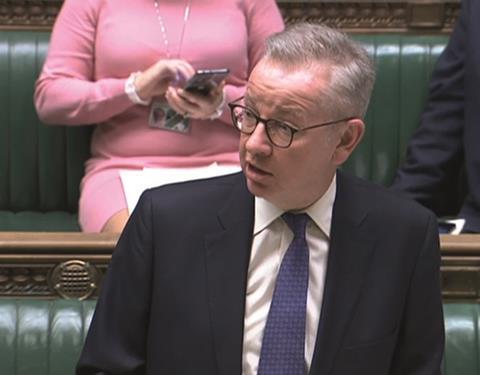Gove brings regulations for ‘Responsible Actors Scheme’ into effect ahead of summer launch
Regulations designed to stop major developers from trading if they fail to undertake fire safety repair work deemed necessary by the government have come into force.

The Responsible Actors Scheme (RAS), which the government says will be fully launched later this summer, has been designed by housing secretary Michael Gove to enforce his plan to get major builders to contractually commit to remediate any “life critical” defects in buildings going back 30 years in the wake of the Grenfell Tower tragedy.
The regulations mean that local authorities will legally be able to block from carrying out planning permissions or receiving building control permits any developers who have been called up by government to sign up to the ‘developer remediation contract’ but have refused to so.
Under the terms of the scheme, the regulations for which are available online, developers invited to join but who do not comply – in particular by refusing to sign the remediation contract - can be blocked from receiving building control sign off and from building out planning permissions. The legal powers for the RAS are contained in Section 126-129 of last year’s Building Safety Act.
Of 51 developers so far asked to sign up to the developer remediation contract, which applies to “life-critical fire safety defects” in 11m-plus English housing schemes built in the 30 years up to April 2022, just two are yet to sign.
Rydon Homes, a sister company of Grenfell construction contractor Rydon Maintenance, has said it will not commit to the contract, with housebuilders Abbey Developments the other outstanding builder.
A statement on the Department for Levelling Up, Housing and Communities website said: “Eligible developers who do not enter into and comply with the terms of the developer remediation contract will not be able to join and remain in the [Responsible Actors] Scheme, and will therefore be prohibited from carrying out major development and gaining building control sign-off.”
An explanatory note published alongside the regulations when they were first printed earlier this summer said: “Developers who are eligible for the scheme but who elect not to make the important commitments set out in the developer remediation contract, or who fail to comply with its terms, should expect to face significant consequences”.
It added that legal commitments to repair buildings by the developers to so far sign the contract are understood to be worth more than £2bn. The explanatory note also confirmed the government’s intention to expand the scheme to other builders once it is up and running. It said: “The developer self-remediation approach, and the RAS, is to be expanded over time to cover other developers who developed or refurbished defective 11m+ residential buildings and should pay to fix them.”
>>See also: It’s time for Gove to stop throwing stones at the housing sector
>>See also: Are we ready for the new Building Safety Regulator?
>>See also: What Gove’s Responsible Actors scheme is likely to mean for building safety
The powers in the RAS are to be enforced by local councils, however, the exact detail of how the system will work has still not yet been revealed with the DLUHC statement saying it expected to launch the scheme “in Summer 2023”.
The Home Builders Federation has previously complained that the RAS provides the Government with “unprecedented powers” over UK businesses, allowing the housing secretary to “keep a list of companies he approves of”.











No comments yet